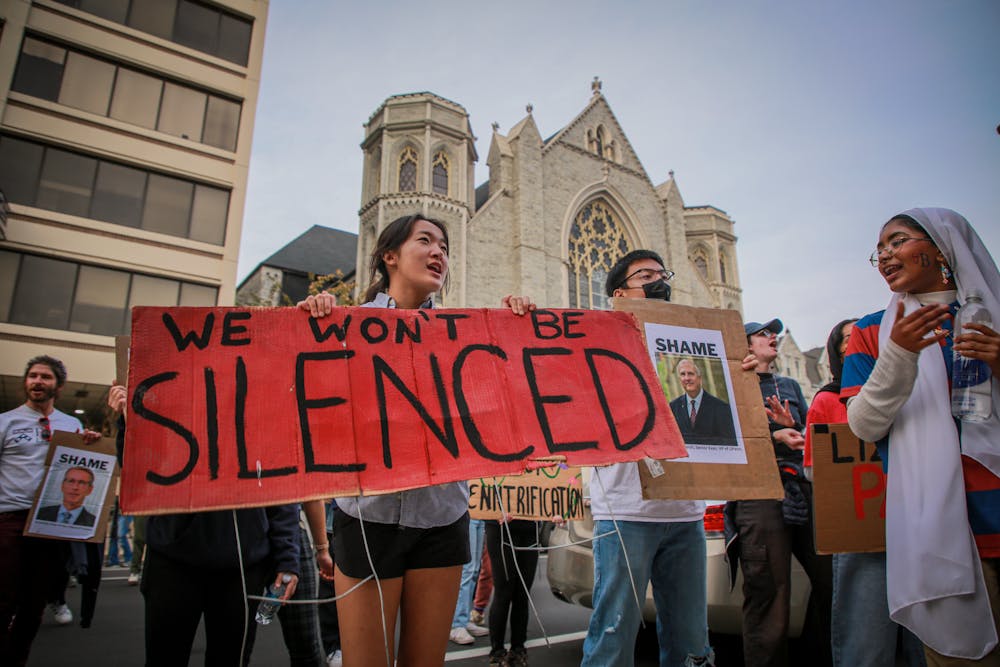Students in Penn Band who participated in Fossil Free Penn Homecoming weekend protests have since been suspended from participation in the band until January 2024.
College sophomore Sabirah Mahmud and College junior Katie Francis were among nearly 75 students who participated in Fossil Free Penn’s protest on Oct. 22, which interrupted Penn’s Homecoming football game against Yale. The protest delayed the game for over an hour and resulted in the arrests of 19 demonstrators.
Although Mahmud said that she and Francis made sure to remove their Penn Band attire before running onto the field, the two students were told in an email from their band director on Oct. 24 that their membership status was “under review.” Mahmud said Penn Band Director Greer Cheeseman informed the students in another email on Nov. 9 that they had breached the band’s constitution by failing to properly uphold the reputation of the University through their actions.
Since then, Mahmud and Francis told The Daily Pennsylvanian that they received separate – but identical – communication on Dec. 19, noting that they have been suspended from Penn Band until January 2024 and have been barred from traveling with the band or holding leadership positions in the group at any point in the future.
Penn Band and Cheeseman have not responded to the DP's request for comment at this time. Previously, in an email on Nov. 2, Cheeseman declined a request for comment, citing that he wanted to "honor the integrity of the membership review process."
The decision was reached after each of the two student protestors said they were granted a private meeting last November with the band's director and executive board, comprised of four student representatives. Mahmud said the students were each allowed to have one additional student in attendance for support, although she noted that they were not permitted to bring a faculty member to advocate on their behalf.
In the midst of these discussions, Mahmud said that her bandmates circulated a petition in support of the two protestors. Francis said that the letters garnered 38 signatures – a majority of the band’s voting body. She added that several of the signees also included personal anecdotes about the students’ impact on the band and its culture to express their dissatisfaction with the disciplinary process.
Francis said that the band’s decision was released on the same day that she received communication from the Center for Community Standards and Accountability regarding her involvement in FFP’s encampment, suggesting that the band may have made its decision due to pressure from University administration. She said that the CSA did not find sufficient cause to pursue disciplinary action against her for her participation in the encampment on College Green.
RELATED:
Year in Review: Penn sees increased climate activism, sustainability initiatives in 2022
Students condemn Penn’s disciplinary actions against protestors at rally, U. Council Open Forum
In an email to the DP, University spokesperson Ron Ozio maintained his previous statement on the issue. Previously, in an email to the DP on Nov. 2, Ozio wrote that the University was not involved in the band’s decision to discipline its members for their participation in the Homecoming protest.
However, both Mahmud and Francis said that they felt as if administration placed pressure on the band to implement consequences that were “harsher than anticipated,” according to Francis.
Francis said that there have been new limitations placed on the Penn Band following the Homecoming protest, including the restriction of the band’s access to the microphone at athletic events. She said that the University also considered canceling Penn Band’s travel plans to an athletic game the following weekend, although the group was ultimately able to travel – with the exception of Mahmud, Francis, and one other student protestor.
“I think that this is just the University's way of attacking students as much as they can because this is where they have power,” Francis said.
Members of the Penn Band are also now required to sign a code of conduct specifying that they will not partake in protests or similar activities “on band time,” according to Mahmud, though she said that “band time” was left ambiguous.
Mahmud said that she was frustrated with the lack of transparency during the weeks-long disciplinary process. She added that although she and Francis were told after their meetings with Cheeseman and the executive board that they would hear a final verdict within a week, it was over two weeks before they heard any news.
Mahmud said that on Dec. 14, she was told by a bandmate that Cheeseman and the executive board had reached a decision about her membership status, although she did not receive official communication from Cheeseman until Dec. 19 — which she noted was in the middle of the final examination period.
Francis added she was disappointed, saying that she felt that the band's decision making deferred to the University rather than defending its members.
“I guess the point of view that [the Penn Band board has] taken in this process is that the band exists to make the University look good and uplift the University, and not really for the students,” Francis said.









